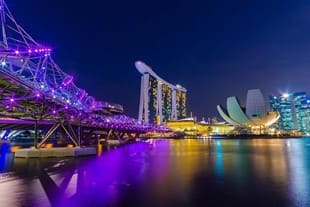
This year marks the 60th anniversary of diplomatic relations between India and Singapore which began with India’s recognition of Singapore, barely three days after Singapore gained Independence in 1965. The bilateral relations between the two countries are characterised by political, defence, economic, cultural, educational and people-to-people contacts. Singapore is a key pillar of India’s Act East Policy and the vision of the Indo-Pacific. The bilateral relations have deepened and also diversified. India-Singapore bilateral relations were elevated to a strategic partnership in 2015, and a comprehensive strategic partnership in 2024. Initially, collaboration remained limited to trade and related sectors. However, by 1995, an Agreement on S&T was signed. A decade later, India-Singapore Comprehensive Economic Cooperation Agreement (CECA) further emphasised on S&T cooperation for closer collaboration and harnessing of R&D capabilities and commercialisation of technologies between the two countries. Some areas identified include marine and agricultural biotechnology, space research, advanced materials and information technology. In 2015, India and Singapore sought to further cooperation in S&T, R&D and Innovation through joint endeavours. Focus areas for India-Singapore agreements in 2018 were higher education, research, artificial intelligence, innovation, machine learning, cognitive computing and big data analytics to improve healthcare, cybersecurity, automation, mobility, smart energy systems and e-governance, cyber security, urban planning, etc. These agreements between institutions also fostered academic and research exchanges and joint research initiatives.
Space has been one of the key sectors of India Singapore S&T cooperation. During 2011-2023, Indian Space Research Organisation has launched 18 Singapore satellites. In 2023, Singapore joined India’s global initiatives towards clean energy like the International Solar Alliance and Global Biofuel Alliance. Last year, Singapore co-hosted the inaugural ASEAN – India Women Scientists Conclave. The 8th Roundtable of ASEAN-India Network of Think Tanks was held in November 2024 in Singapore. More than 25 prominent Think Tanks and policy research organisations from ASEAN and India discussed strengthening of the ASEAN-India Comprehensive Strategic Partnership focusing on both existing and new areas of collaboration including digital connectivity, green energy transition, etc.
The September 2024 Joint Statement between the two countries has more areas of potential cooperation. These include sustainability with potential to cooperate in areas of green hydrogen and green ammonia and efforts towards sustainable development. India and Singapore held an e-workshop in the green economy in September 2024. The second area of cooperation was in the field of digital technologies with common interests in data, AI and cyber security. A MoU on Cooperation in Digital Technologies was signed and both countries also decided to explore cooperation in the areas of critical and emerging technologies. Both sides also decided to set up a Cyber Policy Dialogue, and the inaugural dialogue was held in Singapore in October 2024. In healthcare and medicine, cooperation in medical education, research, Human Resource development and healthcare were identified as areas of potential collaboration. India and Singapore held an e-workshop in the area of digital health and medical technologies in July 2024. Both Prime Ministers agreed that advanced manufacturing, particularly in developing resilient semiconductor supply chains, can be a new pillar of bilateral cooperation, and welcomed the signing of the MoU on India-Singapore Semiconductor Ecosystem Partnership. At the G20 Summit in Brazil in November 2024, Singapore also supported the Indian initiative of the Declaration on Digital Public Infrastructure, AI and Data for Governance.
Singapore has a robust S&T ecosystem and focuses on emerging technologies, sustainability and smart city initiatives. Given, India’s initiatives in renewable energy (like the International Solar Alliance, National Hydrogen Mission), and S&T missions (like India's National Supercomputing Mission, National Biopharma Mission, and Clean Energy Mission, AI Mission), and greater emphasis on space, biotechnology and digital and AI with vibrant research ecosystem. India-Singapore S&T cooperation is poised to grow further in future. Joint statements clearly identify areas of potential collaboration, which include emerging technologies, renewable energy solutions, biomedical R&D, space technologies, etc. Both countries can together contribute towards global efforts for an inclusive and responsible AI governance. India-Singapore cooperation in the semiconductor sector will be significant in shaping the semiconductor ecosystem in India and boost innovation. Additionally, it will diversify the global semiconductor supply chain and enhance resilience. Given both countries' shared commitment towards sustainability, cooperation in renewable energy solutions - especially in solar, wind and green hydrogen as well as sustainable infrastructure, and water and waste management would serve as a model for collaboration in the region and globally towards sustainable development. S&T collaboration between the two countries is mutually beneficial, and will also contribute towards finding S&T solutions for the sustainable future of the region and the world.
The diplomatic relations between India and Singapore have indeed evolved into a multi-faceted partnership, especially in the realms of science, technology, and innovation. Singapore remains a crucial pillar of India’s Act East Policy and vision of the Indo-Pacific. Initially centered around trade, the collaboration has diversified over the decades to include higher education and research space collaboration and clean energy. The future prospects for India-Singapore cooperation include continued collaboration in renewable energy, sustainable development, AI governance, and the semiconductor secto


